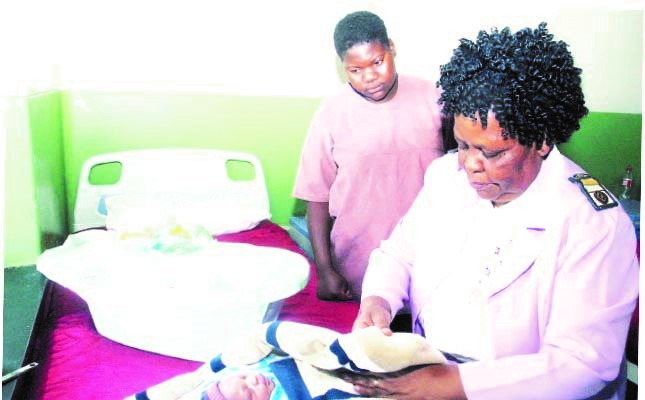Sheillah Mapani Features Writer
Every year, the Ministry of Health and Child Care (MOHCC) acquires condoms for free distribution to help fight the HIV and Aids pandemic. This has been hailed by stakeholders in the health sector as an important strategy to contain the spread of the disease.
However, other keen watchers have decried the absence of similar approaches to sanitary wear which thousands of girls school going age cannot access, especially in rural areas. Some critics suggest that the money being allocated to acquiring condoms be directed to sanitary wear as the latter serves an involuntary call of nature.
Debate on this contentious issue intensified in the past week after MDC Proportional Representation legislator Priscilla Misihairabwi-Mushonga expressed her concerns in a debate which focused on the 2018 national budget saying she prefers the prioritisation of sanitary wear in the budget to condoms.
“On that point Mr Speaker,” she said, “why are we having condoms in the budget and not sanitary wear and yet for men who are over 40 years or 45 years, actually having an erection is almost like winning a lottery.
“It is very difficult for a man over 40 to have an erection. So, we have condoms that are actually not being used because most of these men cannot use them,” the legislator was quoted saying in her contribution which elicited mixed reactions.
Sanitary wear should be prioritised
Said Simon Chuma of Norton: “The MP stated that condoms are luxuries for men, which is wrong for everyone including teenagers use condoms. Though abstinence is being preached everyday it’s rarely practised. Condoms save lives.
“A number of school children born with HIV are sexually active and cannot afford to buy condoms on the market. Providing them with free condoms can help save their lives.”
Others say sanitary wear and condoms should all be provided for free. “Sanitary wear and condoms are both of importance so they should be prioritised,” said Leah Nyamhunga at a Glen View maternity clinic.
“Many couples are using condoms as a family planning method. It’s not true that they are not being utilised. It’s not a waste.”
Padare Men’s Forum on Gender activist Walter Vengesayi, supports the legislator’s position. “The honourable member was making a good point about universal access to sanitary wear. As Men’s Forum on Gender we support efforts towards making sanitary wear available for free,” he said.
“A lot of girls and women are being disadvantaged because they cannot afford them.” He also said free access to condoms and sanitary wear were important as far as sexual, reproductive health and rights were concerned.
“Our Government should prioritise both condoms and sanitary wear because one saves lives and the other improves the well-being of women,” the gender activist said. “So free access to both is important and nothing between the two should be looked down upon.”
Vengesayi disputed assertions on men’s erectile dysfunctions. “It is my humble opinion that one cannot generalise when it comes to erections. Some men have difficulties but the rest are fine so they use the condoms very well,” he said.
“It’s therefore important to say they should be available to those who need them, young and old.
“Condoms are not being wasted because those who cannot use them do not have any need for them but those who can are using them.”
Health experts say that despite the prioritisation of condoms being linked to sexual pleasure, they have multi-purposes.
“They are used by both men and women to prevent the spread of sexually transmitted diseases and as contraceptives for women and girls.
Executive director of Community Working Group on Health (CWGH), Itai Rusike said condoms became a priority in the national budget after 2002 when the government declared AIDS a national emergency. The AIDS Levy and National AIDS Trust Fund were established in 1999 as a unique tax based contribution to public spending.
“Zimbabwe has been among the highest countries affected by HIV in the region but levels have fallen post-2002 due to the free distribution of condoms,” said Rusike. “The country has successfully battled HIV and AIDS pandemic and registered a reduction in both incidence and prevalence through such innovative programmes on condoms and the Aids Levy.” He said the government had managed to the reduce prevalence rate through prioritisation of condom use from 21.5 percent to the current 14 percent.
“Therefore that is enough reason why condoms are being prioritised as lives are being saved,” Rusike said. Despite this, he however, said there was also need for the prioritisation of sanitary wear to enhance access for rural girls.
“Sanitary wear is generally available in most areas but very costly for most girls and women. They have resorted to using unhealthy means such as cow dung, maize stocks and pieces of cloth which can be washed and reused during the next cycle,” he said.
“So lack of proper sanitary products leads to infections which may lead to sexually health related complications.” The Government, he said, needed to include the sanitary wear in the national budget too, to enhance access.
Many people hailed the Misihairabwi’s motion advocating for free sanitary ware but still maintained that condom budgeting was not trivial.
“We applaud the motion that seeks advocate for free sanitary ware, however, comparing condom budgeting as trivial could be uncalled for given that our nation is yet to achieve our 90 percent goal to new HIV infections, as such condoms have been useful for both the age referred, the younger and even older generation,” said Ekenia Chifamba, a Friend of the Girl Child activist. “The absence of condoms could become regressive to the gains made thus far. Sanitary pads are a basic need for the girls and women as we cannot run away from the truth. This is a biological process.
“At the same time the same girls and women who we are advocating for free pads are the same individuals who are engaging in protected sex hence trivialising condom budgeting could be exposing the same girls to HIV infections in the absence of the condoms.” Chifamba said the removal of condoms from the national budget will be retrogressive in the fight against HIV and Aids.
“In maintaining a healthy nation that safeguards the health and well-being of women, condoms become essential to protect them from early pregnancies as well as sexually transmitted diseases,” the gender activist said.
“Removal of condoms could become injurious to the gains made in national development. Although sex is engaged in as a choice, menstruation is biological hence one cannot make a choice to or not to menstruate, both issues ought to be treated the same.”
Zimbabwe still faces challenges with the issue of availability and affordability of sanitary pads as two local companies face closure over lack of foreign currency to import raw materials.
Most of the inputs used in manufacturing sanitary pads are sourced from South Africa and China. Sanitary pads prices range from US$1 to US$10 depending on the type and quality.
The majority of poor rural girls and women cannot afford them. A 2014 National Spending Assessment (Nasa) report suggested that Zimbabwe uses at least $7 million on condoms annually, of which the bulk is donor funded.
In 2016, Zimbabwe distributed at least 110 million condoms countrywide, up from the 80 million distributed in 2014, Government statistics indicate. Condoms have become easier to access as they are given for free in most health institutions and public places. Zimbabwe is number 10 in terms of condom use in countries with generalised HIV epidemic. It distributes about 9 million condoms every month on average.
Top users include Armenia (1) followed by Swaziland, Nigeria, Ukraine, Belize, Mauritius, Gabon, Lesotho and Haiti. In 2016, Zimbabwe spent more than US$11 million to import sanitary wear products, showing a sharp decrease from $23 million in 2015. Duty was scrapped on sanitary wear after legislators piled pressure on the Government. And, while debate on condoms and sanitary wear rages on, it still remains to be seen how the Government will handle this contentious issue in its fiscus.










 Godwin Matanga
Godwin Matanga
